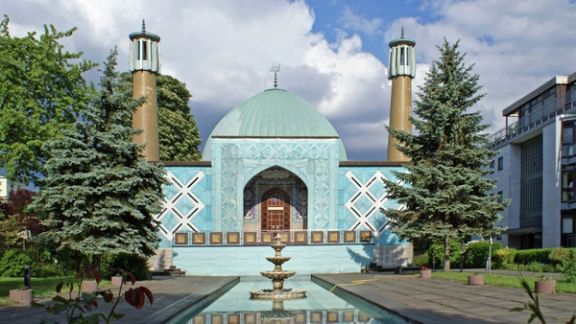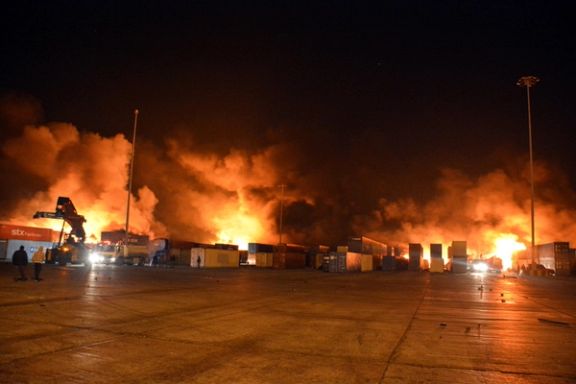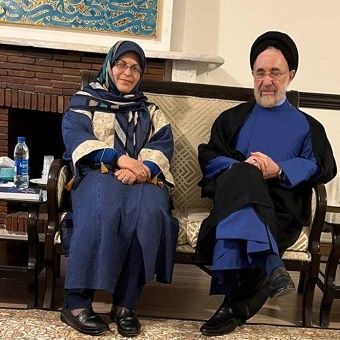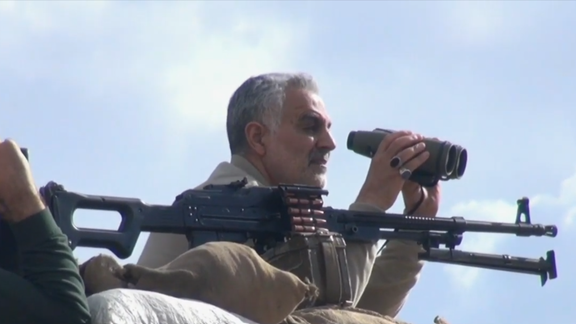German Court Finds Islamic Center As An Extremist Organization

The German Federal Administrative Court ruled that the Blue Mosque, an Islamic center in Hamburg affiliated with the Iranian regime, is an "extremist Islamic organization."

The German Federal Administrative Court ruled that the Blue Mosque, an Islamic center in Hamburg affiliated with the Iranian regime, is an "extremist Islamic organization."
Despite an objection and complaint filed by the center, the Administrative Court of Hamburg upheld the classification of the center's activities as "extremism" by the Federal Office for the Protection of the Constitution of Germany.
The Court began hearing the complaint of the Islamic Center of Hamburg two months ago. However, the decision did not confirm findings by security organs that the center acted as an extension of the Iranian regime in Germany.
Previously, intelligence officials in Hamburg published documents that showed the connection of this center with extremist and Islamist groups, including Lebanon’s Hezbollah.
However, the center claims to be a purely religious foundation that deals with the religious affairs of the Shias.
Earlier, the Secular Islamic Association had asked Germany's Minister of the Interior in a letter to terminate all cooperation with the Central Council of Muslims immediately.
Additionally, the letter said that the Islamic Center of Hamburg promoted Iran's ideology and monitored Iranian citizens in exile as well as disseminating anti-Semitism.
Hamburg's local authorities expelled Seyed Soleiman Mosavi-Far, the deputy for the Islamic Center in November, accusing him of close ties to terrorist groups.
Aside from his involvement in and support for extremist and terrorist Shia organizations, Mosavi-Far had connections with two organizations providing financial assistance with connections to Hezbollah in Lebanon, according to German authorities.

Israel carried out airstrikes near the central Syrian city of Homs early Sunday causing material damage but no casualties, the Syrian military said in a statement.
Israeli authorities did not comment on the airstrike on Homs but said one of the Syrian air defense missiles exploded over northern Israel without causing any damage.
Israeli army spokesman Avichay Adraee later said that Israel's military retaliated for the firing of the air defence missile that exploded over the country's north, by attacking Syrian air defense batteries from where the missile was fired.
It is not clear if the Syrian missile was launched during the air attack near Homs and strayed into Israeli airspace, or deliberately targeted Israel.
Syria uses Russian air defense systems and in recent months Russian forces have been altering these missiles to hit ground targets in Ukraine.
A large segment of the Syrian missile fell in Israel
But in 2022 also a Syrian air defense missile exploded over northern Israel and this could have been a similar incident, although the Israeli air force retaliated against the Syrian missile battery.
Residents of central and southern Israel reported hearing a large blast, according to Times of Israel, and shrapnel was recovered from what appeared to be parts of a surface-to-air missile from a Russian-made S-200 system.
Israel has in recent months intensified strikes on Syrian airports and air bases to disrupt Iran's increasing use of aerial supply lines to deliver arms to allies in Syria and the Lebanese Hezbollah. However, there were fewer reports of attacks in June.
Syrian state media said air defense's intercepted Israeli missiles across central parts of the country, downing most of them. A Syrian army statement said missiles that flew over parts of Lebanon's capital Beirut hit locations in the vicinity of the city of Homs, resulting only in material damage.
Claims by Syrian authorities cannot be independently verified.
After a mid-air explosion heard across Israel, remnants of the Syrian missile landed in Rahat, a town some 180 km (110 miles) south of the armistice line between the countries, Israeli police said. There was no word of any casualties.
Local media showed what appeared to be the blackened front end of a large missile, standing upright in an open area among residential buildings, and tail-fins in a field.
The Israeli military said its warplanes were unscathed.
The Israeli strikes are part of an escalation of what has been a low-intensity conflict continuing for years with a goal of slowing Iran's growing entrenchment in Syria, Israeli military experts say.
Tehran's military presence has grown in Syria since it began supporting President Bashar al-Assad in the civil war that started in 2011.
Thousands of Afghan, Iraqi and other militias trained, supplied and paid by Iran, in addition to the Lebanese Hezbollah, now hold sway in areas in eastern, southern and northwestern Syria and in several suburbs around the capital.
Documents hacked from the foreign ministry by an Iranian opposition group in May revealed that Bashar al-Assad’s government owes Iran $50 billion dollars, excluding Tehran’s direct military expenditures in the civil war.
With reporting by AP and Reuters

An Iranian member of parliament has warned about a looming crisis triggered by medicine shortage, saying that nearly 200 medications are not available.
Mohammad-Ali Mohseni-Bandpey, a member of the parliament's health committee warned in an interview with ILNA news website on Saturday that if a solution is not found, the issue may turn into a social, political, economic, and health crisis.
He said the government's huge debts to the social security organization and the organization's debts to hospitals, as well as the lack of sufficient drug production in the country are the most important factors contributing to the crisis.
During the past years, the authorities attributed medicine shortages in the country to the US sanctions, claiming that the sanctions targeted ordinary people. However, import of humanitarian items, including medicine, is exempt from US embargoes. In fact, Iran has been purchasing around two billion dollars' worth of medicines and raw materials annually for producing drugs from Europe and India.
The Foundation for the Defense of Democracies had previously written in a report that corruption, not sanctions, is causing medicine shortages in Iran.
While European countries had launched the INSTEX mechanism with the permission of the US to export humanitarian items to Iran, they discontinued it in March of last year because of Iran's unwillingness to use this mechanism.
In a joint statement in March, Germany and France said the Iranian leadership has chosen to act against the interests of its people by refusing to cooperate in the export of medicine and other life-saving goods.
Bandpey further noted that in a meeting held last week, the ministers of labor, health, intelligence and the representatives of the Central Bank, as well as the Revolutionary Guard acknowledged that if a solution is not found, this issue may turn into a big problem.
He also referred to the 180-million-dollar debt of the social security organization to hospitals and the government's “ten times larger” debt to this organization, saying that there is a shortage of medicine even in the emergency rooms of hospitals and people have to look for medicines outside the hospital, meaning in the black market.
He underlined that the country cannot produce enough drugs, because the cost of the medicines is more than government mandated prices. Iran's economy is mostly controlled by the government, especially imports of goods, which needs foreign currencies.
Earlier this year, Bandpey said the pharmaceutical companies are moving to other countries as there are "serious hurdles” to their activities.
In January an official of Iran’s drug importers union, Mojtaba Bourbour, challenged government officials’ claims about self-sufficiency in production of medicines and said not only up to 90 percent of raw material is imported from countries such as China and India, but also some medicines are imported from China but sold under Iranian labels.

New developments in In Iran's reformist and conservative camps are indicative of a new momentum in the country's political dynamics ahead of March 2024 elections.
Ultraconservatives, who dominate the current parliament and the government, are ready to go out of their way to ensure their continued supremacy in the political landscape.
The Reformist Front, an umbrella organization of several parties and groups elected Azar Mansouri as the Front's leader last week to replace aging political heavyweight Behzad Nabavi who led the front during the past two years. Mansouri was the front's spokesperson during this period.
However, based on the experience of the last two elections in 2020 and 2021, an electoral watchdog controlled by Supreme Leader Ali Khamenei will determine who can become a candidate. In the 2020 parliamentary vote hundreds of reformist candidates were disqualified, allowing hardliners to dominate the parliament.
Ms. Mansouri took part in a meeting with former President Mohammad Khatami, who is considered the undeclared leader of Iran's reform movement although his recent stances indicate that he is not too eager to risk big changes in the current governing system.
According to Etemad Online, at the meeting Khatami endorsed Mansouri's qualifications as the leader of Iran's Reform Front and insisted on its independence. He said the power and capabilities of the Reform Front depends on its members' strengths and capabilities.

Khatami called on the front's leaders to do their best to ensure its cohesion, while also benefitting from the views of experts outside the front. He added that the front's views should reflect the collective opinion of its members.
At the meeting, Mansouri said that Khatami is the Reform Front's focal point and that all of the reformists agree on his key role.
Meanwhile, according to conservative website Nameh News, Mohammad Ali Namazi, a member of the Centrist Executives of Construction Party (EoC), which is a part of the Reform Front, has said that the Reform Front would have been more successful if its members elected EoC leader Hossein Marashi as its chairman.
However, he added that Mansouri's election as the Reform Front's leader does not mean that the views of her party, the Unity of Nation Party will determine the underlying policies of the front. Ms. Mansouri will have only one vote in determining those policies.
He said a majority of the front's member wanted Nabavi to be elected as the leader, but the aging politician was not interested in the position.
Meanwhile, Namazi made it clear that he is aware that the conservative-led Guardian Council that vets election candidates has already made its decisions about who are those who are allowed to run for the upcoming election.
At the same time changes in the leadership of the conservative camp indicated their strong interest in the upcoming election. In one of the latest developments, political heavyweight Mohammad Reza Bahonar joined SHANA [Persian acronym for the conservative alliance council of revolutionary forces]. Despite what the word "revolutionary" might indicate, the alliance consists of elderly politicians such as Bahonar and former Majles Speaker Gholam Ali Haddad Adel who have been active in Iran's domestic politics for more than four decades.
However, Expediency Council member Bahonar's move to the forefront of electioneering could mean that traditional conservatives are serious in trying to keep their position in the Iranian political landscape despite the power of ultraconservatives, most notably the Paydari Party, to win the lion's share of the seats in the next parliament.
Nonetheless, as Namazi noted, getting through the Guardian Council's net is not guaranteed for anyone unless Supreme Leader Ali Khamenei pulls the right strings for them.

The Islamic Jihad's Secretary-General, Ziyad al-Nakhala, has said that anti-Israeli actions in the West Bank reflect Iranian Supreme Leader’s directives.
He claimed in an interview with Al-Wefaq that to arm the West Bank resistance groups, weapons were either smuggled or purchased directly from the Israelis.
“There was a great focus in order for the West Bank to move from a state of coexistence and calm, to a state of resistance that we see today, and of course all of this is under the directives of Ali Khamenei,” stated al-Nakhala.
“During our last meeting with him in Tehran, he renewed the call for that and for the development of resistance in the West Bank.”
Al-Nakhala praised Iranian regime's support for the resistance, claiming: "There are those who think that Iran provides hundreds of millions of dollars a month, but I say with the least capabilities, a state of resistance has been created in Palestine, and therefore we must not exaggerate the aid."
According to Israeli Defense Minister Yoav Gallant in April, Iran is the “driving force” of a recent multi-front escalation with Israelis through its proxies across the region, funding Hamas – that rules the Gaza Strip -- with $100 million annually with additional funding worth tens of millions of dollars going to the second largest terror group in the Palestinian enclave, the Palestinian Islamic Jihad. Galant said the regime also provides Hezbollah in Lebanon with $700 million a year, as well as “knowledge and strategic weaponry” such as precision-guided munitions.

The Iranian judiciary says a court hearing over the killing of the former IRGC Quds Force Commander Qassem Soleimani killed in a US air strike will begin soon.
Kazem Gharibabadi, the deputy of Iran's Judiciary for International Affairs, said three judges are appointed for the hearings and the process will get underway shortly.
On January 3, 2020, the US military, on the orders of President Donald Trump, killed Soleimani in a drone strike near Baghdad International Airport, saying that he had been "actively developing plans to attack American diplomats and service members in Iraq and throughout the region."
The so-called trial in Iran is a symbolic political gesture.
Soleimani, who was Iran’s top military and intelligence operator outside its borders, was in charge of supporting and organizing militant proxy forces, including the Lebanese Hezbollah and Iraqi Shiite militia groups that have repeatedly attacked US forces.
Last month, Tehran issued arrest warrants for former US President Donald Trump, Secretary of State Mike Pompeo and 71 others for Soleimani's assassination.
Iran had also asked Interpol to issue a Red Notice for 36 individuals, but the request was denied, explaining it was not in accordance with its rules and constitution. “It is strictly forbidden for the organization to undertake any intervention or activities of a political, military, religious or racial character.”
The hardliner President Ebrahim Raisi also vowed revenge in January for Soleimani's killing unless former US President Donald Trump is put on trial.
Iran’s Supreme Leader Ali Khamenei also vowed revenge in a speech on January 1, saying, “Trump and others like him will be forgotten and lost in the dustbin of history, of course after paying for their crimes in the world.”